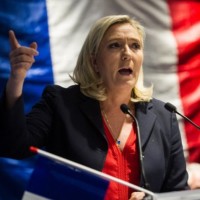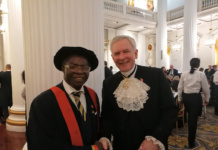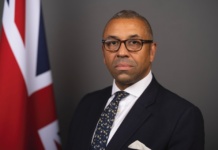France’s ultra-Right-Wing Front Nationale is claiming established parties ganged up to prevent them gaining a foothold in regional elections. Leader Marine Le Pen is nevertheless vowing that nothing will stop her party’s rise ahead of the presidential campaign.

Right of centre Les Republicains, led by Nicolas Sarkozy, won seven of the regions and President Francois Hollande’s Socialist party won five, with the National Front trailing in third position despite its barnstorming result in last week’s first round of voting.
In the vital second round, the numbers of voters increased more than 10 per cent, particularly in the areas where the National Front had won six regions in the first round, indicating many people were motivated to block the far Right.
To avoid splitting the vote, the Socialists had tactically withdrawn from the Nord-Pas-de-Calais-Picardie region contested by Ms Le Pen and the Provence-Alpes-Cote region, where her niece Marionne Marechal-Le Pen was standing. Left-wing supporters were urged to vote for Mr Sarkozy’s centre-right party.
The tactics were so effective that Conservative insurance salesman Xavier Bertrand beat Ms Le Pen 57-43 per cent. Ms Marechal-Le Pen suffered a similar fate, attracting about 45 per cent of the vote. Ms Marechal-Le Pen, who is already a member of the French parliament, said of her opponents: “There are victories that shame the victors.”
Ms Le Pen, who has moderated the party of its most extreme elements since taking over from her father, Jean-Marie Le Pen, was undeterred, saying the failure to win a region would not stop the National Front contesting the national election in 2017.
She pointed to the 6.9 million votes the party had attracted, up from 6.4 million in the 2012 national elections, and insisted her party was now the primary opposition force. She said National Front voters had seen through the “indecent slogans and campaigns of slander and defamation that were decided upon in the gilded palaces of the Republic,” she added.
“Nothing can stop us now. Election after election, the rise of the nationalist tide is inescapable.
“By tripling the number of our regional councillors, the National Front will from now on be the primary opposition force in most of France’s regional councils.”
She claimed the Socialist party had been “eradicated’’ and future elections would be fought on a two-party system, because mainstream parties would have to join forces again to overcome the National Front.
“The first round (of regional elections) left us believing in a three-party system. We are now going into a two-party system,” she said.
“Now the split isn’t between Left and Right, but between those who favour globalisation and the patriots.”
Mr Bertrand, her direct rival in the Nord-Pas-de-Calais-Picardie region, hailed the result as stopping the National Front in its tracks. He had pitched an anti-British campaign, blaming the cross-Channel neighbours for the social issues surrounding 6000 migrants camped in the sand-hills in Calais.
Others were not so triumphant. French Prime Minister Manuel Valls denied the far Right had been defeated. “Far from it,’’ he said.
The National Front was hoping victory in several regions would provide a springboard for the party to dominate the 2017 presidential election.
With the country on a knife-edge following the deaths of 130 people in the November 13 terror attacks on Paris, and worries about unemployment, the lead-up to the general election will be fought on security and migration.
Mr Sarkozy immediately addressed the issues on which the National Front had campaigned — security, migration, the EU and unemployment.
“We must now take the time to debate the fundamentals of great questions that are of anguish to the French,’’ the former president said.









